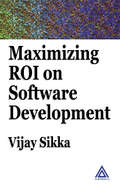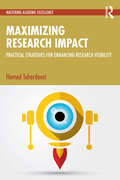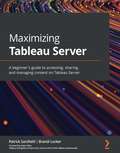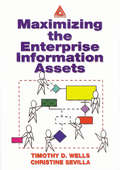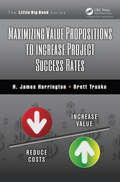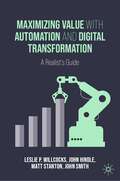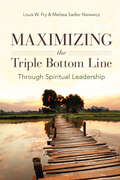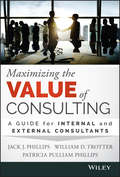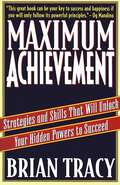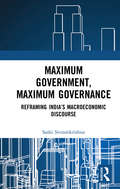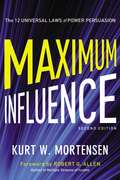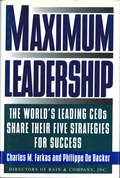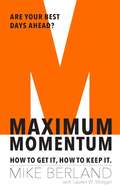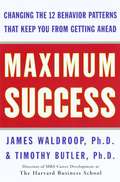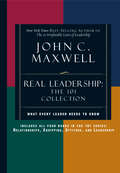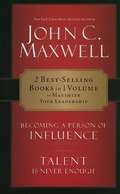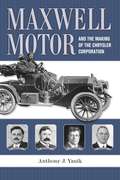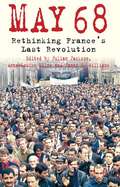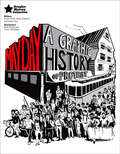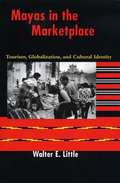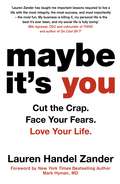- Table View
- List View
Maximizing ROI on Software Development
by Vijay SikkaMaximizing ROI on Software Development explains how to execute best quality software development and testing while maximizing business value. It discusses Applied ROI in the context of methodologies such as Agile and Extreme Programming, and traditional methodologies including Six Sigma, the Capability Maturity Model (CMM ), Total Cost of Ownershi
Maximizing Research Impact: Practical Strategies for Enhancing Research Visibility (Mastering Academic Excellence)
by Hamed TaherdoostMaximizing Research Impact: Practical Strategies for Enhancing Research Visibility offers a comprehensive guide for researchers, academics, and practitioners across disciplines who wish to increase the visibility, accessibility, and influence of their research outputs.This book addresses the challenges and opportunities presented by the rapidly evolving research landscape, including the rise of digital platforms, open access publishing, and the importance of interdisciplinary collaboration. It provides actionable strategies to navigate these changes effectively and ensure that research is not only published but also widely disseminated, recognized, and utilized.Designed for a diverse audience, this will be suitable for early-career researchers, established scholars, and graduate students seeking to build or enhance their academic presence. It will also be useful for research administrators and managers looking to support and promote research within institutions, as well as interdisciplinary and collaborative researchers aiming to navigate and leverage diverse networks. Additionally, the book offers insights for science communicators and media professionals involved in disseminating research to the public.
Maximizing Tableau Server: A beginner's guide to accessing, sharing, and managing content on Tableau Server
by Patrick Sarsfield Brandi Locker Adam MicoEnhance the way you use Tableau Server's analytical tools by learning how to manage content to drive user engagementKey FeaturesUnderstand how to quickly get connected, start publishing workbooks, and adjust basic settingsNavigate the Tableau Server interface to filter and locate content, customize viewing options, and automate various tasksLearn best practices for improving the efficiency of workbooks and data sourcesBook DescriptionTableau Server is a business intelligence application that provides a centralized location to store, edit, share, and collaborate on content, such as dashboards and curated data sources. This book gets you up and running with Tableau Server to help you increase end-user engagement for your published work as well as reduce or eliminate redundant tasks. You'll explore Tableau Server's structure and how to get started by connecting, publishing content, and navigating the software interface. Next, you'll learn when and how to update the settings of your content at various levels to best utilize Tableau Server's features. You'll understand how to interact with the Tableau Server interface to locate, sort, filter, manage and customize content. Later, the book shows you how to leverage other valuable features that enable you and your audience to share, download, and interact with content on Tableau Server. As you progress, you'll cover principles to increase the performance of your published content. All along, the book shows you how to navigate, interact with, and use Tableau Server with the help of engaging examples and best practices shared by recognized Tableau professionals. By the end of this Tableau book, you'll have a solid understanding of how to use Tableau Server to manage content, automate tasks, and increase end-user engagement.What you will learnGet well-versed in Tableau Server's interface to quickly and easily access essential contentExplore the different types of content and navigate through the project hierarchy quicklyUnderstand how to connect, publish, manage, and modify content on Tableau ServerDiscover how to share content and collaborate with othersAutomate tedious tasks by creating custom views, alerts, subscriptions, and data refresh schedulesBuild data visualizations using Web EditUnderstand how to monitor disparate metrics on multiple dashboardsWho this book is forThis Tableau software book is for BI developers, data analysts, and everyday users who have access to Tableau Server and possess basic web navigation skills. No prior experience with Tableau Server is required.
Maximizing The Enterprise Information Assets
by Timothy Wells Christine SevillaThe ramifications of this new Information Age are still not well understood. Most businesses do not know how to turn their information into a beneficial capital asset. Unfortunately, their focus has been almost exclusively on technology, while human and managerial factors are left unexplored.Maximizing the Enterprise Information Assets defi
Maximizing Value Propositions to Increase Project Success Rates (The Little Big Book Series)
by H. James Harrington Brett TruskoBlueprint 4 continues the theme of Blueprint 2 in looking at the opportunities for using market forces for environmental ends. It assesses a range of possible imaginative 'global bargains', which give all parties a self-interested incentive to improve the global environment. The book begins by reviewing the principle global issues to be addressed, and then explains the mechanisms of resource degradation: how economic systems fail, the operation of trade on the environment and the effects of population growth and consumption patterns. It then shows how environmental value can be captured, and the basis, means and institutions for doing so.
Maximizing Value While Managing Risk: Mastering the Legal Aspects of Business
by V. Kasturi Rangan Constance E. BagleyUnderstanding the legal dimensions of business is essential to successful management in today's global marketplace. This chapter shows you how to harness the empowering nature of the law and the legal system not only to avoid trouble, but to increase the total value created and the firm's share of that value.
Maximizing Value with Automation and Digital Transformation: A Realist's Guide
by John Smith Leslie P. Willcocks Matt Stanton John HindleThis book is an indispensable guide for executives, programme leaders, and business owners on maximising value from automation and digital transformation. It provides a real-world journey map of automation, from RPA through to intelligent automation, with a focus on practical strategy and management principles intended to help seize the trillions of dollars that are still being left on the table by companies that have not yet made this leap. Though grounded on the research and advisory work of the author team, this book offers clear eyed, easy to read advice for avoiding the ‘transformation bog’ where many organisations find themselves, struggling to maintain their strategy in an environment that feels increasingly dynamic and confusing. This book is not blinded by the brilliant new technology and hones in on what works and what distracts. It provides a total value of ownership framework for navigation and identifies seven core digital capabilities required for success. Ultimately a book for realists rather than digital idealists, it will be a vital resource for professionals who must chart a course to verifiable business performance improvement through digital enterprise empowerment amid often conflicting priorities.
Maximizing the Triple Bottom Line Through Spiritual Leadership
by Louis W. Fry Melissa Sadler NisiewiczMaximizing the Triple Bottom Line through Spiritual Leadership draws on the emerging fields of workplace spirituality and spiritual leadership to teach leaders and their constituencies how to develop business models that address issues of ethical leadership, employee well-being, sustainability, and social responsibility without sacrificing profitability, growth, and other metrics of performance excellence. While this text identifies and discusses the characteristics necessary to be a leader, its major focus is on leadership—engaging stakeholders and enabling groups of people to work together in the most meaningful ways. The authors offer real-world examples of for-profit and non-profit organizations that have spiritual leaders and which have implemented organizational spiritual leadership. These cases are based on over ten years of research, supported by the International Institute of Spiritual Leadership, that demonstrates the value of the Spiritual Leadership Balanced Scorecard Business Model presented in the book. "Pracademic" in its orientation, the book presents a general process and tools for implementing the model.
Maximizing the Value of Consulting: A Guide for Internal and External Consultants
by Jack J. Phillips Patricia Pulliam Phillips William D. TrotterProvide organized, efficient, relevant consulting with lasting value Maximizing the Value of Consulting is an indispensable, practical guide for managing, measuring, and delivering the results that make internal and external consulting a lasting value to clients and the company. Sponsored by the ROI Institute and the Association of Internal Management Consultants, this book provides a roadmap to relevance for consultants operating in the increasingly fast-paced, changing, dynamic environment. Readers will learn how to use resources properly and manage the investment efficiently, while truly connecting to the business, securing appropriate levels of commitment, and providing adequate levels of support. Detailed coverage includes guidance toward calculating the value of consulting in terms that executives understand, including business impact and ROI, and using the appropriate tools to show how things are working throughout the process. Whether organizations are using internal or external consultants, or both, consultants can provide better value to the company. Consultants are needed to provide advice, support, and insight into the processes undertaken to improve the business, and integrate the input of different functional units into a more streamlined strategy. This book is designed to help consultants provide the utmost value to clients by maximizing organization, efficiency, and ultimately, ROI. Manage for value with better organization and cost control Set objectives at multiple levels to deliver useful results Measure implementation, impact, ROI, and intangibles Use final results to drive appropriate actions, creating lasting value The skyrocketing need for internal and external consultants will continue, in almost every functional area ranging from HR and technology, to auditing and risk management. Maximizing the Value of Consulting provides a manual for relevant, value-driven consulting, with world-renowned expert insight.
Maximum Achievement: Strategies and Skills that Will Unlock Your Hidden
by Brian TracyBrian Tracy is one of the world's leading authorities on success and personal achievement, addressing more than 100,000 men and women each year in public and private seminars. In Maximum Achievement, he gives you a powerful, proven system -- based on twenty-five years of research and practice -- that you can apply immediately to get better results in every area of your life.You learn ideas, concepts, and methods used by high-achieving people in every field everywhere. You learn how to unlock your individual potential for personal greatness. You will immediately become more positive, persuasive, and powerfully focused in everything you do. Many of the more than one million graduates of the seminar program upon which this book is based have dramatically increased their income and improved their lives in every respect.The step-by-step blueprint for success and achievement presented in these pages includes proven principles drawn from psychology, religion, philosophy, business, economics, politics, history, and metaphysics. These ideas are combined in a fast-moving, informative series of steps that will lead you to greater success than you ever imagined possible -- they can raise your self-esteem, improve personal performance, and give you complete control over every aspect of your personal and professional life.
Maximum Exposure (The\heartlands Ser.)
by Jenny HarperShe’s a professional photographer – but is she ready to expose her heart?Adorable but scatterbrained newspaper photographer Daisy Irvine becomes the key to the survival of The Hailesbank Herald when her boss drops dead right in front of her. And while big egos and petty jealousies hinder the struggle to save the paper, Daisy starts another campaign – to win back her ex, Jack Hedderwick.Ben Gillies, returning after a long absence, sees childhood friend Daisy in a whole new light. He’d like to win her love, but discovers that she’s a whole lot better at taking photographs than making decisions, particularly when she’s blinded by the past.When tragedy strikes Daisy’s family, loyalty drives her home. But it’s time to grow up and Daisy must choose between independence and love.
Maximum Government, Maximum Governance: Reframing India’s Macroeconomic Discourse
by Sashi SivramkrishnaAusterity, fiscal consolidation, fiscal discipline and fiscal deficit targets have become the buzzwords of contemporary macroeconomic policy. By tracing the history of macroeconomic schools of thought, Maximum Government, Maximum Governance explores the origins, essence, shortcomings and deception of mainstream neoliberal macroeconomics. Arguing that economies are financially constrained, neoliberal macroeconomics dislodged full employment as the target of policy replacing it with a low and stable inflation target. Monetary policy under the control of an independent central bank became the primary instrument to assist free and globalized markets to propel economies towards full employment. However, the global financial crisis of 2008 and rising inequalities of income and wealth in the last decade within and across economies has led to rise of nationalist-populist leaders in many parts of the world. Although neoliberal economics has been put under the scanner by these leaders, their actions seem reactionary and without a coherent understanding of alternative schools of economic thought. An alternative based on sound economic reasoning and institutional realities is required to challenge neoliberal and arbitrary populist policies.Based on an introductory analysis of Modern Money Theory (MMT), this book seeks to present an alternative viewpoint on macroeconomics and macroeconomic policy to address the challenges of economic growth, unemployment and inequality. While adherents of MMT are convinced of its robustness, the challenge is to reframe macroeconomic discourse, which must essentially reject the notion that an economy is financially constrained and instead turn the spotlight on real resource and governance constraints. Please note: Taylor & Francis does not sell or distribute the Hardback in India, Pakistan, Nepal, Bhutan, Bangladesh and Sri Lanka
Maximum Influence: The 12 Universal Laws of Power Persuasion
by Robert G. Allen Kurt W. MortensenSalespeople, consultants, managers, executives, entrepreneurs. . . Influence is a crucial tool for absolutely anyone seeking success and prosperity. But how can everyday people actually become more influential? Maximum Influence unlocks the secrets of the master influencers. Now in an all-new edition, the book combines scientific research with real-world studies, presenting the most authoritative and effective arsenal of persuasion techniques ever. Author and renowned expert Kurt Mortensen reveals the 12 Laws of Persuasion, explaining why each law works, how to use it, and what to avoid. You will learn about the law of dissonance, the law of contrast, the law of expectation--and nine other proven principles that consciously and unconsciously propel people to act. You willalso discover how to: * Read anyone instantly * Get people to trust you instinctively * Change minds easily * And convince anyone to give you almost anything. With new case studies and cutting-edge influencing techniques, this is the ultimate guide to the art and science of getting exactly what you want--when you want.
Maximum Leadership
by Charles M. FarkasBusiness fads come and go, but the importance of corporate leadership as a determining factor for success has never been doubted. But exactly what is corporate leadership? Is it a CEO with a strong personality, one with strong management skills, one who has a combination of these traits--or something else entirely? What factors, in other words, make a powerfully effective corporate leader? In this era of increasingly fierce global competition few questions spark as much controversy and debate.Thus, in the summer of 1994, the authors of this book began traveling across North America, Europe, and Asia to interview the heads of more than 160 majormultinational corporations, in industries as diverse as entertainment, banking, diamond mining, and semiconductors. Their goal was the explore the role of the CEO--to discover how the men and women at the pinnacle of some of the world's most prominent companies fulfill their role as leaders. They came away not with abstract theories about management but with real stories about how CEOs actually spend their days, whom they see, where they go, which decisions they make, which they don't, and why. In the process, the authors uncovered new and provocative evidence that there exist five distinct styles of leadership. In Maximum Leadership they illustrate those styles--or "approaches," as they call them--with vivid examples and the candid voices of CEOs at companies such as Coca-Cola, Gillette, Nintendo, Hewlett-Packard, Goldman Sachs, and Nestle.These executives and dozens of others tell fascinating, revealing, often funny and sometimes poignant stories about the challenges they face and how they have met them. Some are "human assets" leaders, running their companies by scrupulously managing hundreds of individuals and the relationships between them. Others are "box" leaders, who define their role as building the fortress of rules, regulations, and corporate culture that will guarantee their companies success. There are also strategic leaders, expertise champions, and change agents, each with their own unique qualities, priorities, and styles of managing, both day-to-day and over the long term. With these five approaches and the authors' cogent analyses of them, Maximum Leadership introduces a new vocabulary for understanding how companies are run to achieve their greatest potential and offers important insights for those inside the corporate office--and everyone whose career is impacted by what happens there.
Maximum Malpractice Protection: A Physician’s Complete Guide
by Charles TheislerThe spectre of destructive malpractice lawsuits haunts every practicing doctor who simply wants protection and peace of mind, but most physicians find the world of malpractice confusing and wrapped in legal riddles. This book’s purpose is to explain medical malpractice concepts in everyday terms, combined with solid practical advice to help you: Protect and safeguard your medical career and practice Identify what is and isn't considered malpractice Readily comply with all legal duties required of doctors Prevent malpractice allegations and minimize liability Take control to protect assets, and minimize personal and professional losses Work with your attorneys to establish the best possible defense Walk through each clinical aspect of the patient encounter from the perspective of a malpractice attorney
Maximum Momentum: How To Get It, How To Keep It
by Mike BerlandDo you wonder why some ideas go viral and others sink? Why one political candidate soars while another fails to gain traction? Why one product becomes an instant rage, while its competitor struggles to stay above water? What is the secret to momentum? Many people believe that momentum is driven by emotion and is unpredictable, but as Mike Berland, the internationally recognized pollster and strategic advisor, has discovered, it&’s actually a science, with easily analyzed metrics. In Maximum Momentum: How to Get It, How to Keep It, Berland reveals the key to momentum, beginning with the simple physics formula— mass x velocity. He then develops a Momentum Matrix—five signals that decode the science into effective measures. Maximum Momentum is a lively examination of hot trends in the current arena—from politics to society to business to sports. Using colorful graphics to underscore the stories, Berland examines the people, issues, movements and products that most captivate Americans.
Maximum Success
by James Waldroop Timothy ButlerMaximum Success is a compelling exploration of the behavior patterns that cause people to undermine their careers - as well as specific advice on how to overcome them. Have you ever wondered why some people seem to rise effortlessly to the top, while others are stuck in the same job year after year? Have you ever felt you are falling short of your career potential? Have you wondered if some of the things you do - or don't do - at work might hamstringing your ambitions? In Maximum Success, James Waldroop and Timothy Butler, directors of MBA career development at Harvard Business School, identify the twelve habits that over and over again - whether you are a retail clerk or a partner in a law firm are almost guaranteed to hold you back.
Maxwell 101 Collection
by John C. MaxwellIncludes all four books of the 101 series: Relationships, Equipping, Attitude, and Leadership.
Maxwell 2-in-1 Becoming a Person of Influence & Talent Is Never Enough
by John C. MaxwellBecoming a Person of Influence and Talent Is Never Enough is authored by John C. Maxwell and bundled into a 2-in-1 collection.
Maxwell Motor and the Making of the Chrysler Corporation
by Anthony J. YanikThough usually regarded as a footnote in automotive history, Maxwell Motor was one of the leading automobile producers in the United States during the first quarter of the twentieth century, and its cars offered several innovations to buyers of the time. For instance, Maxwell's was the first popular car with its engine in front instead of under the body, the first to be designed with three-point suspension and shaft drive, and one of the earliest cars to feature thermo-syphon cooling. In Maxwell Motor and the Making of the Chrysler Corporation, Anthony J. Yanik examines the machines, the process, and the men behind Maxwell, describing both the vehicle engineering and the backroom wheeling and dealing that characterized the emergence and disappearance of the early auto companies. In this detailed history, Yanik charts the company's evolution through the early Maxwell-Briscoe years, 1903-1912; the Maxwell Motor Company years, 1913-1920; and finally the Maxwell Motor Corporation years, 1921-1925. He considers the influential leaders, including Jonathan Maxwell, Benjamin Briscoe, Walter Flanders, and Walter P. Chrysler, who executed the business decisions and corporate mergers that shaped each tumultuous era, concluding with Chrysler's eventual deal to transfer all Maxwell assets to form a new Chrysler Corporation in 1925. Yanik also discusses the aftermath of Maxwell's dissolution and the fate of its famous corporate leaders. For this study, Yanik draws on a wealth of primary sources including old automotive trade journals, the writings of Ben Briscoe and William Durant, and company records in the Chrysler archives. Maxwell Motor and the Making of the Chrysler Corporation fills a gap in existing automotive scholarship and proves that the Maxwell story is an excellent resource for documenting the development of the automobile industry in the early twentieth century. Auto buffs and local historians will appreciate Yanik's thorough and engaging look at this slice of automotive history.
May 68: Rethinking France's Last Revolution
by Julian JacksonThe events of 1968 are often seen purely as a student revolution, but impacted on every aspect of French society - theatre, film, sexuality, race, the countryside, the factories. This volume explores the full diversity of this extraordinary upheaval, and shows how 1968 continues to reverberate in France today.
May Contain Lies: How Stories, Statistics, and Studies Exploit Our Biases—And What We Can Do about It
by Alex EdmansHow our biases cause us to fall for misinformation—and how to combat it. Our lives are minefields of misinformation. It ripples through our social media feeds, our daily headlines, and the pronouncements of politicians, executives, and authors. Stories, statistics, and studies are everywhere, allowing people to find evidence to support whatever position they want. Many of these sources are flawed, yet by playing on our emotions and preying on our biases, they can gain widespread acceptance, warp our views, and distort our decisions. In this eye-opening book, renowned economist Alex Edmans teaches us how to separate fact from fiction. Using colorful examples—from a wellness guru’s tragic but fabricated backstory to the blunders that led to the Deepwater Horizon disaster to the diet that ensnared millions yet hastened its founder’s death—Edmans highlights the biases that cause us to mistake statements for facts, facts for data, data for evidence, and evidence for proof. Armed with the knowledge of what to guard against, he then provides a practical guide to combat this tide of misinformation. Going beyond simply checking the facts and explaining individual statistics, Edmans explores the relationships between statistics—the science of cause and effect—ultimately training us to think smarter, sharper, and more critically. May Contain Lies is an essential read for anyone who wants to make better sense of the world and better decisions.
May Day: A Graphic History of Protest
by Mark Leier Robin Folvik Sean Carleton Graphic History CollectiveMay Day: A Graphic History of Protest traces the development of International Workers’ Day, May 1st, against the ever-changing economic and political backdrop in Canada. Recognizing the importance of work and the historical struggles of workers to improve their lives, with a particular focus on the struggles of May 1st, the comic includes the reader as part of this history, and the story concludes that “We are all part of this historical struggle; it’s our history and our future.”
Mayas in the Marketplace: Tourism, Globalization, and Cultural Identity
by Walter E. LittleSelling handicrafts to tourists has brought the Maya peoples of Guatemala into the world market. Vendors from rural communities now offer their wares to more than 500,000 international tourists annually in the marketplaces of larger cities such as Antigua, Guatemala City, Panajachel, and Chichicastenango. Like businesspeople anywhere, Maya artisans analyze the desires and needs of their customers and shape their products to meet the demands of the market. But how has adapting to the global marketplace reciprocally shaped the identity and cultural practices of the Maya peoples? Drawing on over a decade of fieldwork, Walter Little presents the first ethnographic study of Maya handicraft vendors in the international marketplace. Focusing on Kaqchikel Mayas who commute to Antigua to sell their goods, he explores three significant issues: sum; how the tourist marketplace conflates global and local distinctions. sum; how the marketplace becomes a border zone where national and international, developed and underdeveloped, and indigenous and non-indigenous come together. sum; how marketing to tourists changes social roles, gender relationships, and ethnic identity in the vendors' home communities. Little's wide-ranging research challenges our current understanding of tourism's negative impact on indigenous communities. He demonstrates that the Maya are maintaining a specific, community-based sense of Maya identity, even as they commodify their culture for tourist consumption in the world market.
Maybe It's You: Cut the Crap. Face Your Fears. Love Your Life.
by Lauren Handel ZanderWhat's standing in the way of your best life? It's not your boss, your mother or your metabolism. Maybe it's you.Lauren Handel Zander knows that people are hungry for results-oriented, no-nonsense advice. Someone to tell it to them straight. To give them not only inspiration to change, but a step-by-step plan to get it done. That's what she's done for tens of thousands of clients at Handel Group with her take-no-prisoners brand of radical personal accountability - a proven program that has worked for bestselling authors, top businesspeople, award-winning artists . . . and now, you.In Maybe It's You, you will finally and forever learn to:*Cut the crap about being 'true to yourself', when you don't have a clue who that is.*Tell the truth and nothing but your truth. *Manage the head you call home.*Get good at keeping promises to yourself.*Find your sense of humour. Yes, it's missing.Whether you want to find love, succeed at work, fix a fractured relationship, or lose weight, Maybe It's You will offer a road map to help you finally get there.
